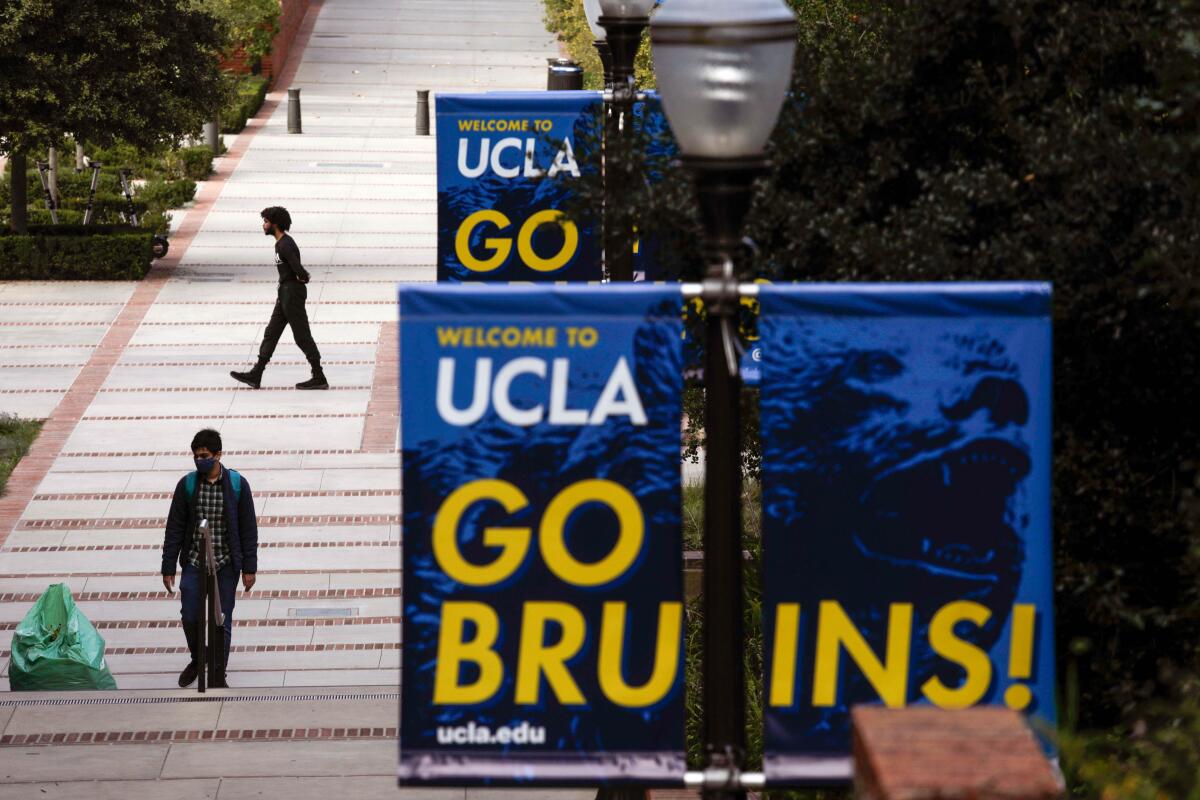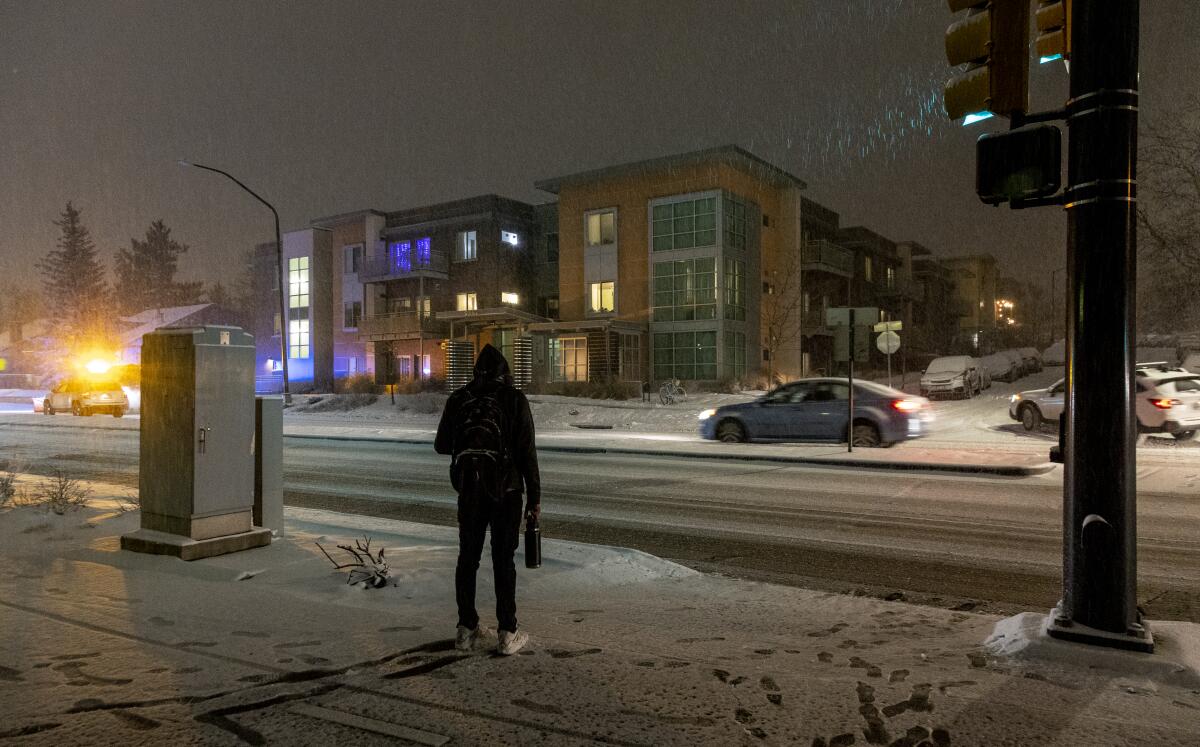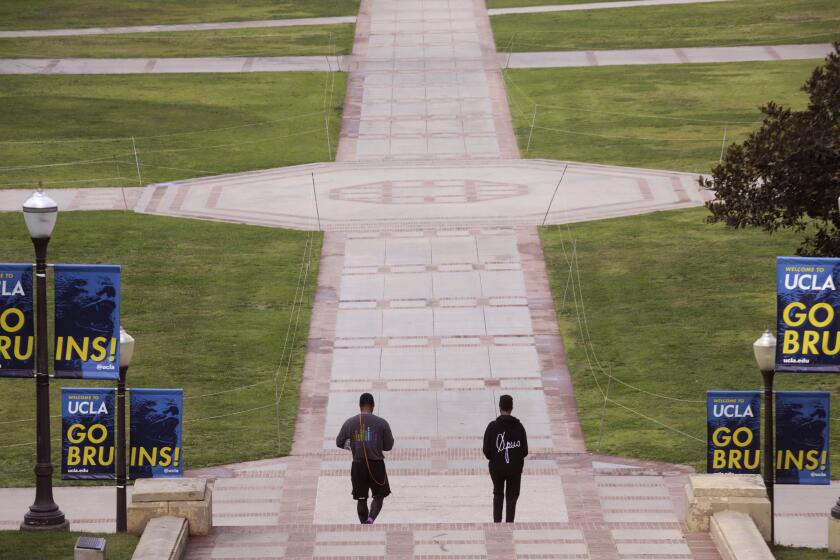UCLA instructor’s behavior alarmed students before threats of mass campus violence

To his students at UCLA, the warning signs about lecturer Matthew C. Harris seemed abundant and longstanding.
By the spring 2021 quarter, the philosophy lecturer had gained a reputation as odd and quixotic, speaking haltingly, changing his syllabus willy-nilly and spending the first four weeks of his “Philosophy of Race” class without once showing his face over Zoom.
Things got weirder as the term progressed, students said, leading up to a final exam that included an essay question about the hate-filled manifesto of Christopher Dorner, a former LAPD officer whose 2013 shooting rampage killed four people and wounded three others. Students were asked to consider the “oppression, disrespect and loss of dignity” suffered by the homicidal ex-cop.
Eventually, one student said she reported Harris to campus authorities and the FBI, after he directed another student to his YouTube channel, which included disturbing references to sexual perversion and bomb threats at Los Angeles International Airport. UCLA removed the post-doctoral fellow from his post last spring, after emails he sent to his mother uncovered even more graphic, and specific, alleged threats.
What galled and frustrated some UCLA students Tuesday was what they deemed a slow and nebulous response by university administrators to threats of mass violence, allegedly made by Harris, that surfaced a day earlier. It was a delay they said left them anxious and under-informed for long hours through the night and up to Harris’s arrest Tuesday in Boulder, Colo.
Though the indications of potential violence arrived Monday afternoon, it was not until more than eight hours later, just before midnight, that UCLA tweeted all classes would be held remotely “out of an abundance of caution.” Campus police were “actively working with out-of-state & federal agencies,” the tweet said. At the time, UCLA did not release information about the location of the person of interest.
A former UCLA lecturer taken into custody Tuesday for threatening mass violence was barred by a Los Angeles judge last year from going near a University of California professor he vowed to kill.
High anxiety on the university’s Westwood campus finally began to dissipate around noon Tuesday, when police and prosecutors in Boulder announced that they had arrested Harris, 31, for unspecified state charges. Boulder Police Chief Maris Herold called Harris’ manifesto “very violent” and “very disturbing.”
But the relatively quiet ending felt far from certain around the Westwood campus, where the first warning signs of potential trouble emerged in the wee hours of Sunday morning, escalating to the alleged violent threats beginning Monday afternoon. Some of Harris’ menacing statements were delivered via more than 300 YouTube videos, most of which were uploaded that day.
It began just before 1 a.m. Sunday, when Harris sent an email to his former students, replete with racist slurs against Jewish and East Asian people. Administrative Vice Chancellor Michael Beck confirmed in an Instagram video Monday night that UCLA staff members were aware that Harris had messaged students.
At about 3:30 p.m. Monday, philosophy department Chair Sherrilyn Roush sent an alert to department members that Harris had begun directing threats at UCLA. She said campus police and behavioral specialists were “investigating with urgency.”
By 6:30 p.m., someone posted on Reddit a department alert recommending that professors hold classes remotely, as the material included a video titled “UCLA Philosophy Mass Shooting” and an “800-page manifesto with specific threats toward some members of the department.” Several emails from philosophy department leaders and multiple instructors, obtained by The Times on Monday night, alerted students that in-person classes would not be held.
At 9:25 p.m., the first campus-wide message went out, saying that campus police were aware of the “concerning email and posting.” Police were engaged with out-of-state law enforcement and would keep the community informed, the tweet added.
That created an instant backlash on Twitter. “What @UCLA and @UCPDLA are failing to inform students and staff of is that this ‘concerning email’ is a major mass shooter threat at UCLA,” one person tweeted.
It was not until 11:57 p.m. that UCLA canceled in-person classes for Tuesday. The alert said campus officials “do not have specific information that this individual is in CA,” adding: “Out of an abundance of caution, all classes will be held remotely Feb 1. We will keep you updated.” By Tuesday morning, UCLA sent another notice, saying that the individual who had made the threats was outside the state and “under observation.”
Matthew Harris’ neighbors in Boulder, like UCLA students, criticized authorities for not informing them more promptly of the threat he may have posed.
Mini Mishra, a freshman neuroscience major, said she and others felt “strung along” by UCLA administrators. “It’s incredibly frustrating to see that we as students have to deal with finding information instead of being updated by UCLA admin.,” Mishra said in an email to The Times. “Students shouldn’t have to fight to have information given to them, especially seeing as it is threatening the lives of everyone on campus.”
Lizette Garcia, a 22-year-old sociology student at UCLA, was in a Zoom class Monday evening when her phone started blowing up with messages on a GroupMe chat with her classmates. She felt frustrated that it took until past midnight to get word that in-person classes would not be held the next day.
“I just feel like the school continues to treat us like commodities,” Garcia said.
In a campus message Tuesday, UCLA officials told students they were “greatly relieved” that Harris is in custody and offered campus counseling for anyone needing it. Classes would resume Wednesday.
“The threats made yesterday were frightening for many of us and caused our community to feel vulnerable at an already challenging time,” said Suzanne L. Seplow, assistant vice chancellor for student development and health, and Michael Deluca, assistant vice chancellor for campus life.
Asked about the delay in notifications, a UCLA spokesman pointed to the administrators’ statement and thanked campus police and other law enforcement for “thoroughly investigating these threats as soon as we learned of them and for coordinating to locate and arrest the individual in Colorado.”
It was not until a midday press conference in Boulder that the details emerged: Harris had barricaded himself inside his apartment, across the street from the University of Colorado campus. It took three hours before he surrendered, 11:07 a.m., Mountain Time. He did not put up a struggle, authorities said.

Because he made the alleged threats across interstate lines, Harris was turned over to federal authorities and was expected to face charges in U.S. courts, likely involving threats and weapons.
Harris had been on law enforcement’s radar since at least last spring, when the LAPD’s mental evaluation unit made contact with him, Chief Michel Moore said Tuesday. Police began to monitor his whereabouts after he was released from a mental health facility, according to a court filing.
Last May, lawyers for the University of California sought a restraining order to bar Harris from all campuses and to prevent him from coming near two individuals he allegedly threatened — a philosophy professor at another UC campus and a UCLA administrator. Much of the evidence a judge used to grant the order in June came from Harris’ mother, in the form of troubling emails her son sent her, the court filing said.
In one of the emails attached to the court action, Harris detailed his plan to “hunt” the professor and “put bullets in her skull.” Harris had once pressed the professor, via texts and emails, to date him. In his email to his mother, he blamed the professor for “giving me schizophrenia,” the court filing said. Another email said: “I am ready to go Chris Dorner on these white people,” in reference to the Black ex-officer who went on the 2013 murder spree.
In the January 2021 emails Harris sent his mother, he also compared himself to the shooter who massacred 26 people, most of them children, at Sandy Hook Elementary School in Connecticut in 2012.
The university attorney described behavior by Harris that “steadily escalated from reported incidents of conduct with students involving graphic materials of a sexual and violent nature which resulted in him being placed on investigatory leave ... to now outright death threat to petitioner’s employee.”
It’s unclear when Harris moved to Boulder, and residents in his apartment building told a reporter Tuesday they didn’t know him or what he was doing in the university town. But police said they were aware of his presence. They had one contact with him in October, though they did not not describe the nature of that incident.
In November, he tried and failed to buy a gun in Colorado’s Jefferson County. Officials said the purchase was denied because a special “gun violence” restraining order prohibiting Harris from buying or possessing firearms had been requested by UC attorneys and granted by a Los Angeles judge
Then came this week’s fusillade of video and written threats, describing “killing, death, murder, shootings, bombs,” that Harris planned to unleash, the Boulder police chief said.
The “UCLA PHILOSOPHY (MASS SHOOTING)” video, posted Sunday, contained disturbing imagery, including footage of the 2017 mass shooting at a Las Vegas music festival and clips from the 2003 movie “Zero Day,” which is loosely based on the Columbine High School mass shooting.
In several of his videos, Harris made racist comments. He cryptically named specific locations on the UCLA campus and said they were added to his “list.”
The Times obtained a partial copy of Harris’ email to the UCLA philosophy department, which included additional evidence of a troubled mind.
“Da war is comin,” he wrote. “forward dis [expletive] to our tha goldhead caucasoid princess.”
The restraining order filing said that Harris’ mother sent the menacing emails in April to the professor, saying that she “felt physically ill reading them.” The professor passed them on to university officials.
“I’m sorry to drop all this on you out of the blue,” the elder Harris wrote to her son’s professed target. “I only know I wouldn’t be able to live with myself if I did nothing and someone got hurt.”
Times staff writers Molly Hennessy-Fiske in Boulder, Colo., James Rainey, Kevin Rector and Gregory Yee contributed to this report.
More to Read
Sign up for Essential California
The most important California stories and recommendations in your inbox every morning.
You may occasionally receive promotional content from the Los Angeles Times.
















